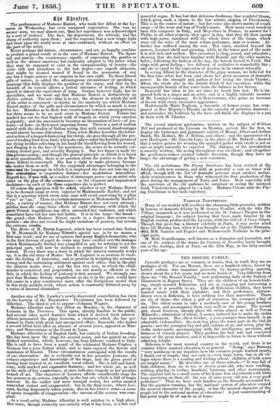THE BROITSIL FAMILY.
Juvenile prodigies are so common in music, that in truth they are no prodigies at all. For one Mozart, there are a hundred others, forced by hotbed culture into immature precocity by ftnoney-getting parents, shown about for a few years, and no more heard of. Very different from these are "the Brousil Family," now performing daily at the Gallery of Illustration in Regent Street. They are the children of an honest-look- ing, simple-minded Bohemian, and are as engaging and interesting a group as it is possible to see. Like all Bohemian children, they have learned music with their alphabet; and their proficiency, extraor- dinary even in Bohemia, is here nothing less than marvellous. There are six of them—the eldest a girl of seventeen, the youngest a boy of six. The eldest seems to take a motherly care of her young brothers and sisters, and accompanies them very well on the piano. The second girl, about fourteen, already plays the violin almost as well as Teresa, Milariollo ; admiration of whom, it seems, induced her to make the violin her instrument. Her eldest brother, a year younger than herself, is sot admirable violoncellist ; the next boy plays the tenor part on the viol cis gamba ; and the youngest boy and girl, infants of six and seven, play the violin under-parts, accompanying with the intelligence, precision, and firmness of veteran players. They perform the best solo and concerted music of the great masters, and it is impossible to listen to them without admiring delight. Bohemia is the most musical country in the world, and there is no country where musical education is so general. "Being," says Burney, "very assiduous in my inquiries how the common people learned music, I found out at length, that not only in every large town, but in all vil- lages where there is a reading and writing school, children of both sexes are taught music." He describes one of these schools—" It was full of little children, from six to ten or eleven years old, who were reading, writing, playing on violins, hautbois bassoons and other instruments. The organist had in a small room of his house four clavichords with little boys practising on them all : his son of nine years old was a very good performer." Thus we have such families as the Brouslls accounted for. But the question remains, has the national system of education created the musical character of the people, or has the musical character of the people led to the national system of education? A just understanding of this point might be of use to us at home.


































 Previous page
Previous page